- Home
- J. F. Penn
One Day In Budapest
One Day In Budapest Read online
Contents
Cover Page
Quote and Dedication
Prologue: Basilica
Chapter 1: Synagogue
Chapter 2: Mob
Chapter 3: Escape
Chapter 4: Delicatessen
Chapter 5: House of Terror
Chapter 6: Bridge
Chapter 7: Jump
Chapter 8: Szechenyi Baths
Chapter 9: Bosnia
Chapter 10: Labyrinth
Chapter 11: Relic
Chapter 12: Footage
Chapter 13: Memento Park
Chapter 14: The Raven
Chapter 15: Synagogue
Thank you
Author’s Note
About J.F. Penn
Acknowledgements
One Day In Budapest
A Thriller By J.F. Penn
Copyright © J.F. Penn (2013). All rights reserved.
http://www.JFPenn.com
This book is a work of fiction. The characters, incidents and dialogue are drawn from the author’s imagination and are not to be construed as real. Any resemblance to actual events or persons, living or dead, is fictionalized or coincidental.
“All murderers are punished unless they kill in large numbers and to the sound of trumpets.”
Voltaire
Dedicated to the memory of those buried in the mass grave of Dohany Street Synagogue, Budapest
PROLOGUE
The gun-metal dawn ended another bleak night of Hungarian winter. The sky lightened from pitch black to the colors of bullets and armor, the military might of Hungary’s past resonant even in nature, a landscape unable to forget its violent past.
Father Zoli Kovács pulled his vestments closer about him and hurried across the square towards the Basilica of St Stephen, looking up at the grandeur against the backdrop of rain clouds. Although physically chilled, he felt the spiritual warmth of ownership, a pride that came from working at the heart of Hungary’s faith. The grand Neo-Classical facade was flanked by two bell towers that stretched into the brightening sky, beacons of faith in a country that had suffered so much. Over the gigantic entranceway were carved the words of Christ, ego sum veritas et vita, I am the truth and the life. Father Zoli murmured as he crossed himself, his fingers crippled with arthritis now, but still able to perform his most treasured of gestures.
As he slowly mounted the Basilica steps, he thought that he heard a footfall echo in the square behind him. He turned, but it was empty, with only a few desultory pigeons pecking at the litter left by yesterday’s tourists. There were homeless around here, of course, but he felt a shiver up his spine as he sensed something different. After a moment, he shook his head, dismissing his feelings as the wandering of an old man’s mind.
Entering the Basilica, Father Zoli paused and breathed in the cool air, the scent of incense hanging like a prayer. Every morning he went through this same ritual, for he felt closer to God in the dark. When he turned on the lights, the splendor of gold seemed to push the vault of heaven far from him, so he savored this quiet moment as a special blessing before he started his day. Sometimes he imagined that the angels guarding the church were watching, that his gentle presence allowed them to drift into the ornate dome and find a place to rest, knowing that he would protect the church during the day. Father Zoli was at peace as he began to light candles around the church, making his way deeper into the nave as the day began to seep in through the stained glass. He stopped to light a special candle in front of the altar dominated by a huge statue of St Stephen, known as St Istvan in Hungarian.
Stephen had been the first King of Hungary, reigning in the early eleventh century, conquering the lands of Transylvania and the Black Magyars, extending his realm and power through battle. As he lay dying with no living heir to succeed him, Stephen had raised his right hand and implored the Blessed Virgin Mary to take the Hungarian people as her subjects and to reign as their Queen. After his death, miracles occurred at his tomb and King Stephen was canonized as the first confessor king of the Catholic church, venerated as the patron saint of Hungary as well as of all kings and dying children.
Reflecting on Stephen’s devotion, Father Zoli crossed himself again and headed into the side chapel to check on the holy relic that lay at the heart of the Basilica. As he turned, the candles flickered and he heard a door bang, but the entrance to the church was too far away now to see clearly. Father Zoli debated whether to go and greet the early morning faithful, but he was a man of routine and his duty called.
He unlocked the door to the side chapel from a bundle of keys at his waist and walked through the wooden doors to the shrine. The Holy Right was St Stephen’s mummified and incorruptible right hand, the very hand that had given Hungary into the keeping of the Virgin Mary. The brown, shriveled flesh was bunched into a fist and lay upon a bed of scarlet velvet, studded with pearls and rubies. The relic was surrounded by a glass case with a vaulted roof, decorated with gold and silver filigree and protected on all sides by angels and winged beasts. Crossing himself once more, Father Zoli approached with reverence and placed his fingertips gently against the glass. This was the closest anyone could get to the most holy relic of Hungary, a representation of the State itself, precious as both a religious treasure and a national symbol. World War I had seen the decimation of the Austro-Hungarian Empire, and subsequent regimes had oppressed the people, but this hand was a sign that one day Hungary would rise again.
Taking a clean white handkerchief from his pocket, Father Zoli polished the glass, wiping it clean of his prints and making it new again. Tourists paid for the privilege of lighting the shrine in order to take photographs, so he felt that they deserved a clear view.
He heard footsteps and then the creak of the door opening into the shrine. He turned to see a man enter, clean cut, well dressed, with the air of the privileged. His nose was like a beak, his hair waxed to a perfect shine.
“The shrine isn’t open to the public yet, my son,” Father Zoli said as the man stepped further into the chapel, his hands in his pockets. His eyes darted around the room, but as he confirmed that they were alone, they were drawn irresistibly to the shrine. Father Zoli felt a sudden stab of alarm and moved in front of the Holy Right, to shield it from the voracious eyes.
“I only come to worship, Father,” the man said, stepping closer, but in his voice Father Zoli heard an echo of the past, a whisper from the dungeons of the Secret Police where the screams of the tortured drowned out all other sound. Cold fear crept over his skin as two more men stepped into the room behind the first, and closed the door behind them.
“What do you want?” Father Zoli said, his voice breaking as his heart pounded with fear.
“You protect the Holy Right,” the first man said. “But what you give to us now, Father, will take the cause of Hungarian nationalism to new heights. St Istvan will be waiting for you with all the treasures of Heaven. You believe that, don’t you?”
Father Zoli heard the intent and turned, desperate for a way out. He wasn’t ready to go to God yet, and despite his aged body, he clung to life.
The man stepped to the side of the altar and picked up one of the ornate candlesticks, hefting its weight in his hand. Behind him, the other two men fanned out, one taking up a heavy Bible and the other pulling a knife.
“Please, no,” Father Zoli fell to his knees, knowing that he couldn’t outrun them. “I can get you money, my sons. I can get you help. I’m no threat to you.” His voice was hysterical, sobs choking his throat as his desperate fingers clutched at the shrine for divine help.
“Sorry, Father. We need this symbol more than you need your life.”
The man stepped in and swung the candlestick like a baseball bat, smashing it against the side
of Father Zoli’s head. The priest crumpled to the floor, pain exploding, vision clouding. He called out to St Istvan, the mummified hand now obscured by spots of his own blood. It was the last thing he saw as blows rained down and his old body became a sacrifice in that holy place.
CHAPTER 1
Dr Morgan Sierra stared out of the window as the taxi from Budapest airport sped towards the city. It was raining and the grey light served to emphasize the monotone of passing streets, punctuated only by the bright neon signs of fast food outlets and sex shops. She noticed banners advertising candidates for the upcoming elections, faces she didn’t recognize and words in a language that was alien to her. Morgan smiled, for it was one of the aspects that thrilled her about European travel. Within a short plane ride, or even just a train journey, you could be in a different culture with unpronounceable words, making an adventure of even the shortest business trip.
Morgan had volunteered for the short assignment to Budapest, desperate to get out of the ARKANE headquarters and renew the boundaries of her independence. She had joined the Arcane Religious Knowledge And Numinous Experience Institute with the understanding that she could focus on her own research, but there had been little opportunity for that so far. The last few missions had taken their toll on her body and emotions, so Director Elias Marietti had asked her to remain close to base, and let time heal the scars. But Morgan was restless if she spent too much time thinking, and while her partner Jake was still in recovery, she wanted to get out of the office. She smiled to herself, because that office just happened to be an astounding complex under Trafalgar Square in London, with access to the secret knowledge of the world. Still, it felt good to be somewhere different, even for such a short time.
Her hand rested on a thick briefcase, a discreet handcuff attaching it to her wrist. Morgan touched the leather, warm from her skin, as she had held it on her lap for the short plane flight from London. The briefcase contained two precious artifacts: an early painting by the Jewish-Hungarian artist Béla Czóbel and an antique Torah. Both had been stolen from the Gold Train during the Second World War and now they were finally being returned to the Jewish synagogue in Budapest. Their provenance had been determined beyond question by the ARKANE Institute, and Morgan had volunteered to return them personally.
Morgan was brought up in Israel, her father Jewish and her mother a Welsh Christian. Although she had never converted to Judaism, Morgan knew the pain of European Jewry and wanted to honor her father’s memory by being the courier who restored just a tiny part of the plunder. She had read of the history of the Gold Train, one of the many scandals of the aftermath of the war. The Nazi-operated train had been carrying valuables stolen from Hungarian Jews when it was intercepted by American forces in 1945. Many of the owners, nearly 600,000 Hungarian Jews, had been shipped off to Auschwitz-Birkenau to be murdered in the gas chambers, so the treasures had not been returned. After 1946, much of the valuable property was sold and the proceeds given to the International Refugee Organization, but two hundred paintings disappeared into personal collections. In 1998, the Hungarian Gold Train records finally became public and in 2005, the US government had settled with the Hungarian Holocaust survivors, with the money allocated to Holocaust charities.
The taxi pulled up in front of the Dohany Street synagogue and Morgan paid the fare, exiting into pouring rain. The smell of baking and fresh coffee made her stomach rumble, and she glanced at her watch. There was just enough time to grab a bite before her appointment with the Curator of the Museum at the Synagogue.
A few minutes later, Morgan was sitting in the window seat of a small cafe with a strong black coffee and a slice of poppyseed roulade in front of her. As she sipped her dark addiction, the rain eased and through a break in the clouds, the sun illuminated the stunning facade of Europe’s largest synagogue. Built in Moorish style, the architecture reminded her of the Alhambra in Spain, with minarets topped with onion domes and striped bands of red, gold and patterned brick. The facade was dominated by a large rose window with the Hebrew script from Exodus 25:8: “And let them make me a sanctuary that I may dwell among them.” Morgan had read that Adolf Eichmann had set up his office behind that rose window in 1944, directing the establishment of the Ghetto as he orchestrated the horror of the Final Solution. She shook her head. This area had seen such suffering, but perhaps these objects could at least bring a touch of restitution.
As Morgan finished her coffee and the last crumbs of roulade, the door opened and she heard a faint chanting and shouting in the distance, sirens wailing. A man came in and spoke with the cafe owner in a hushed voice, before going back outside and starting to pull down shutters over the front of the windows.
“So sorry, Madam,” the woman who had served her said, with a rueful smile. “We close now. Would you mind … outside?”
“Of course,” said Morgan. “I was just leaving anyway. Has something happened?”
The woman glanced out of the window towards the synagogue, her gaze full of concern, fingers clutching the edges of her skirt.
“It’s difficult …” The woman searched for the words in English. “Today, murder at Basilica, there may be trouble …”
Her voice trailed off but her eyes were fearful. Morgan knew that look, for she had seen it many times in Israel as the sirens warned of an imminent attack. In her years of growing up there, and later as a military psychologist, that expression had blossomed dark on the faces of Jews and Palestinians alike, both sides locked into a Sisyphean conflict. Fear, she had discovered, had no nationality.
Morgan left the cafe as the woman bolted the door behind her and folded inner shutters over the glass windows. On the street outside, a stiff breeze made the election banners wave and crackle. Opposite the shop was a huge signboard advertising the Eröszak party where the handsome face of their leader, László Vay, stared out, his clean-shaven politician’s face portraying both strength and charisma. His dark curls were tousled perfectly, his mouth was a sensuous cupid’s bow and his eyes, the color of the Caribbean, offered depths of implied pleasure. But the beauty of the man obscured the dark politics of his right-wing political party, Morgan thought. Eröszak was calling for a national registry of Jews and their possessions, a hideous reflection of what had happened here within living memory.
Walking over to the synagogue entrance, Morgan lined up with the other early tourists at the gate for the security check. As the uniformed guards protecting the entrance searched bags, she noticed that they kept looking nervously towards the main road, where the noise of shouting was getting louder.
“I’m here to meet with Anna Bogányi,” Morgan said to the security guard when she reached the front of the queue. She was careful to keep her hands where he could see them, used to the rigors of security in Israel. She didn’t want to take the handcuff off until the briefcase was safe within the grounds of the synagogue, but she opened the case so that the guard could see inside. The man was distracted, his gaze flitting to the street where it met the main road of Karoly Krt, leading to the city. He glanced in at the contents, the rolled up canvas in the specially constructed box and the Torah.
“Wait,” he said, his voice curt. He turned briefly to call to one of the guards inside the metal gates in Hungarian and after a moment, he nodded.
“You can go through.”
Morgan walked through the gates into a narrow area that ran across the front of the main synagogue entrance. A thin woman with cropped red hair came forward to greet her, wrapped in a multi-colored patchwork shawl against the pervasive cold. Behind her legs, a dark-haired little girl peeped out, bright eyes shining with curiosity. Morgan was reminded of her own niece, Gemma, for whom she would do anything.
“Dr Sierra. Welcome and thank you for coming all this way. I’m Anna, the Museum Curator.”
Her eyes dropped to the briefcase.
“It’s my pleasure to be here,” Morgan smiled, noting her eagerness. “I’m thrilled to be the courier for this piece of history. And who
’s this?”
Morgan squatted down so that her face was level with the little girl, who hid her own face in the folds of her mother’s skirts.
Anna laughed. “Don’t be shy, sweetie … this is Ilona, my daughter. She helps out in the Museum sometimes.” A shadow passed over Anna’s face. “Today, it’s safer for her to be here than at school.”
Morgan noticed that behind her the security guards were shutting the gates and instructing the remaining tourists to leave since the synagogue was closing for the day.
“Has something happened?” Morgan asked. “The lady in the cafe across the road said something about a murder.”
Anna turned and indicated that Morgan should follow her into the shelter of the museum staircase. There was an undercurrent of tension as Anna glanced behind her, out towards the main street. Ilona ran in front of them up the stairs, her little footsteps echoing in the marble hallway.
As they followed her, Anna explained.
“The news has been on the radio in the last hour. The custodian priest of St Stephen’s Basilica was brutally murdered there this morning, and not only that, but the Holy Hand of St Istvan, the symbol of the Hungarian nation, has been stolen. The shrine has been smashed and the relic taken.”
“But why close the synagogue? What has that to do with the Jewish community?” Morgan asked.
“There was a star of David painted in the priest’s blood on the wall of the chapel.” Anna’s eyes were hollow as she spoke, as if she saw back into the ashes of the Ghetto. “The Hebrew word nekama, meaning revenge, was scrawled next to it.”
Morgan frowned. “But surely that’s not enough for people to blame the Jewish population before a proper investigation can be carried out?”
“It could be enough to spark the anti-Semitic violence that constantly simmers beneath this city,” Anna said. “But there’s nothing we can do, and right now I’d rather focus on the joy of the return. The items you bring are finally back where they belong, even though there is no one left of the family they were taken from. Come.”

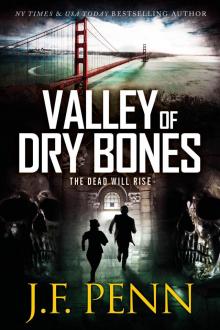 Valley of Dry Bones
Valley of Dry Bones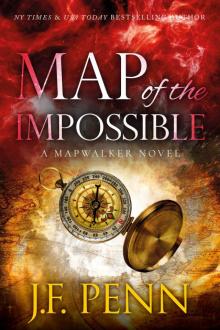 Map of the Impossible
Map of the Impossible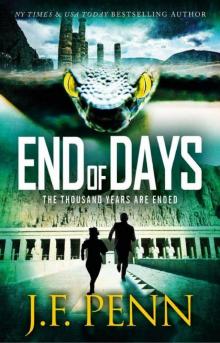 End of Days
End of Days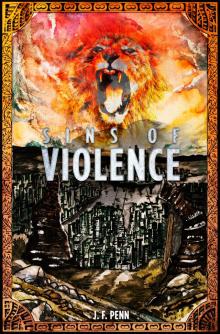 Sins of Violence
Sins of Violence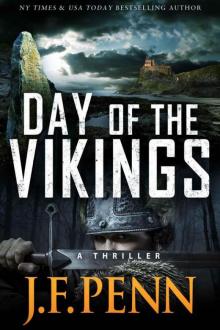 Day of the Vikings
Day of the Vikings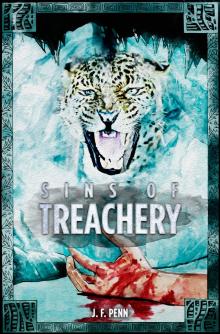 Sins of Treachery
Sins of Treachery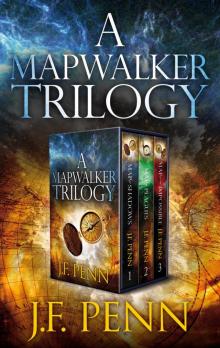 A Mapwalker Trilogy
A Mapwalker Trilogy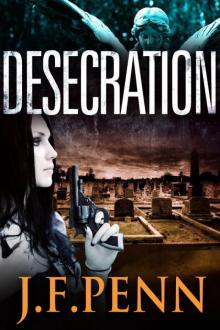 Desecration
Desecration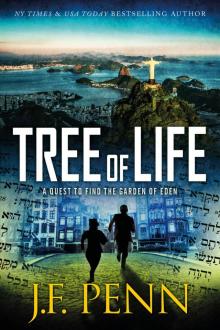 Tree of Life
Tree of Life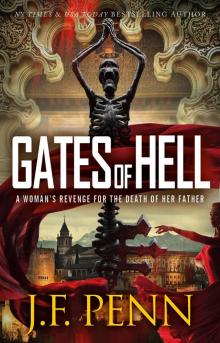 Gates of Hell
Gates of Hell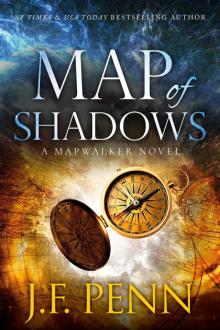 Map of Shadows
Map of Shadows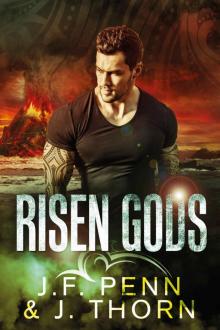 Risen Gods
Risen Gods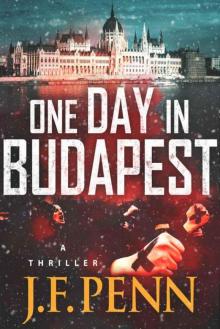 One Day In Budapest
One Day In Budapest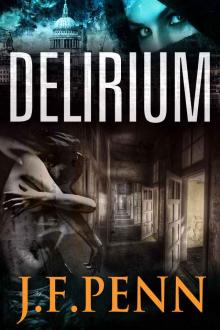 Delirium (London Psychic)
Delirium (London Psychic)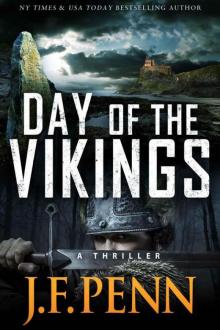 Day of the Vikings. A Thriller. (ARKANE)
Day of the Vikings. A Thriller. (ARKANE)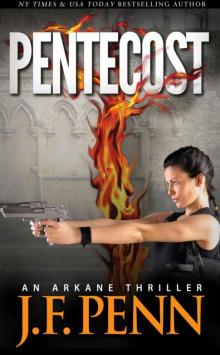 Pentecost. An ARKANE Thriller (Book 1)
Pentecost. An ARKANE Thriller (Book 1)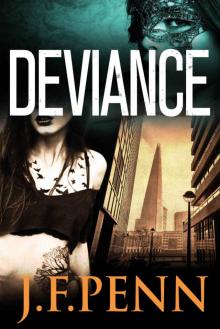 Deviance (The London Psychic Book 3)
Deviance (The London Psychic Book 3)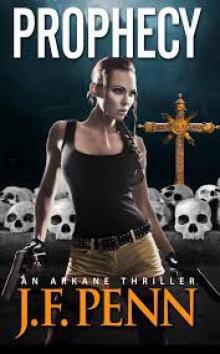 Prophecy. An ARKANE thriller. (Book 2)
Prophecy. An ARKANE thriller. (Book 2)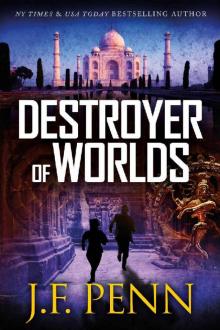 Destroyer of Worlds (ARKANE Book 8)
Destroyer of Worlds (ARKANE Book 8)